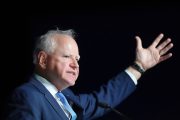
In the Washington Times on Wednesday, Judge Andrew Napolitano asked rhetorically in the title above his column: “Does the United States still have a Constitution?“ Though he never explicitly says yes, it is clear from his analysis that his question refers to a de facto abandonment of, not de jure elimination of, the Constitution.
Despite being ignored and circumvented, the Constitution is still the law of the land, and still protects our freedom, needing only to be upheld and applied. Napolitano writes:
The Constitution does not permit the government to infringe upon personal freedoms, no matter the emergency or pandemic.
The founders crafted the Constitution “both to establish the government and to limit it.” Article 1, Section 8, of the Constitution specifies the powers of the Congress, the only branch of the federal government that may make law. But Congress may not make any law it chooses; in its law-making it is limited to exercising only its enumerated powers.
Others protections against the abuse of power are found in the first 10 amendments to the Constitution, collectively known as the Bill of Rights. For example, the First Amendment explicitly prohibits Congress from violating freedom of religion, speech, and the press, and “the right of the people peacefully to assemble and to petition the Government for a redress of grievances.” And the Second Amendment protects “the right of the people to keep and bear arms.” But in addition to the rights listed in the Bill of Rights, the people possess many other rights not articulated therein.
Napolitano explains:
The Ninth [Amendment] declares that the enumeration of rights in the first eight shall not mean that there are no other rights that are fundamental, and the government shall not disparage those other rights.
The Tenth [Amendment] reflects that the states have reserved [to themselves] the powers that they did not delegate to the [federal government.]
Without explanation or expansion the judge used the term “natural rights,” assuming that his readers would automatically know what he was referring to:
Natural rights collectively constitute the moral ability and sovereign authority of every human being to make personal choices – free from government interference and without a government permission slip.
In an interview with The New American magazine, Pastor David Whitney with the Institute on the Constitution gave a fuller description of the source of man’s rights by quoting from the opening paragraph of the Declaration of Independence:
When in the Course of human events, it becomes necessary for one people to dissolve the political bands which have connected them with another, and to assume among the powers of the earth, the separate and equal station to which the Laws of Nature and of Nature’s God entitle them, a decent respect to the opinions of mankind requires that they should declare the causes which impel them to the separation. [Emphasis added.]
The Declaration states clearly that
All men are created equal, that they are endowed by their Creator with certain unalienable rights….
We, therefore, the representatives of the united state of America, “appeal … to the Supreme Judge of the World….
With a firm reliance on the protection of divine Providence, we mutually pledge to each other our lives, our fortunes, and our sacred honor.
In other words, as expressed by Whitney’s Institute:
- There is a God.
- Our rights come from Him.
- The purpose of civil government is to secure and protect our God-given rights.
On the day the Declaration was signed Samuel Adams said: “We have this day restored the Sovereign to Whom alone men ought to be obedient. He reigns in Heaven and … from the rising to the setting sun, may His kingdom come.”
John Hancock wrote: “Let us humbly commit our righteous cause to the great Lord of the universe … let us joyfully leave our concerns in the hands of Him Who raises up and puts down the empires and kingdoms of the earth as He pleases.”
James Madison wrote: “Religion … [is] the basis and foundation of government … before any man can be considered as a member of civil society, he must be considered as a subject of the Governor of the Universe.”
John Adams wrote: “We recognize no Sovereign but God, and no King but Jesus.”
Napolitano’s article flowed naturally from the principle that all rights come from God — though again, he uses the phrase “natural rights.” All powers that temporal government might have come only “from the consent of the governed” who are themselves governed by their Creator.
Napolitano noted in his column that
interferences with the exercise of rights protected by the Bill of Rights devolve around travel, assembly, commercial activities, the exercise of religious beliefs, and your face. These infringements have all come from mayors and state governors who claim the power to do so, and they raise three profound constitutional issues.
He then raised three critical questions regarding these infringements. First, Napolitano asked:
Do mayors and governors have the inherent power to craft regulations that carry the force of law in an emergency?
The answer is no … the separation of powers [crafted into the Constitution by the founders gives] each [branch of government] a distinct core function that cannot constitutionally be performed by either of the other two.
What about state legislatures that give temporary powers to the governor to handle “emergencies”? Asked the judge:
Can state legislatures delegate away to governors their law-making powers? Again, the answer is no, because the separation of powers prevents one branch of government from ceding to another branch its core powers.
Lastly the judge asked:
Third: can a state legislature enact laws that interfere with personal liberties protected by the Bill of Rights, prescribe punishments for violations of those laws, and authorize governors to use force to compel compliance?
Again, the answer is no, because all government in America [federal, state, and local] is subordinate to the natural rights [emphasis added] articulated in the Bill of Rights and embraced in the Ninth Amendment.
Why did the founders limit governmental powers? Why did they separate those limited powers among three branches of government, and also divide powers between the national government and the states? Because men — including men who govern others — possess a sinful nature that must be held in check. John Emerich Edward Dalberg Acton, first Baron Acton (1834–1902), an historian and moralist who was otherwise known simply as Lord Acton, expressed this opinion in a letter to Bishop Mandell Creighton in 1887:
Power tends to corrupt, and absolute power corrupts absolutely. Great men are almost always bad men.
Thomas Jefferson explained:
In questions of power, let no more be heard of confidence in man, but bind him down from mischief by the chains of the Constitution.
Back to Napolitano. Referring particularly to those “dangerous people” who govern on the state level and “who are again threatening to take away our ability to make personal choices and use force to compel compliance,” he ended optimistically:
We must remind them that by using the powers of state governments to do this, they will make themselves candidates for federal criminal prosecutions when saner days return.




